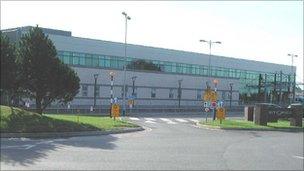Ysbyty Gwynedd settlement for man's cardiac arrest after injection
- Published

Aubrey Harris spent three days in hospital recovering from the injection
A health board has paid a five-figure out-of-court settlement to a patient who suffered a cardiac arrest after adrenalin was injected into his vein.
Aubrey Harris, 70, was taken to Ysbyty Gwynedd in February 2010 after his face swelled due to an allergic reaction.
A hospital investigation confirmed the adrenalin should have been injected into a thigh muscle.
Betsi Cadwaladr University Health Board admitted liability, saying it had updated its training procedures.
On his arrival at hospital, Mr Harris was initially been given antihistamine and cortisone injections but these failed to reduce the swelling.
A nurse then injected adrenalin into a vein, causing him to suffer a cardiac arrest and collapse within seconds.
'Basic mistake'
Mr Harris, a self-employed health and safety contractor, was resuscitated and recovered after three days in hospital while his heart stabilised.
An investigation by the hospital confirmed that the adrenalin should only have been injected into the thigh muscle, and not given via the vein.
It said that adrenalin should only be injected into the vein as a last resort, and even then in a reduced dosage.
The nurse involved in the incident was suspended.
Law firm Irwin Mitchell said Betsi Cadwaladr University Health Board (UHB) had admitted liability and apologised, agreeing to pay Mr Harris a five figure sum to cover his injuries and lost earnings.
Mr Harris's wife Shirley said: "I don't understand how things like this can happen. It seems like such a basic mistake to make.
"It was extremely distressing to see my husband collapse and not be able to do anything about it, particularly as it came almost immediately after being given medication that was supposed to help with his allergic reaction.
"It was terrifying not knowing what was going to happen to my husband and we are just so relieved he pulled through.
"I hope no one else ever has to go through what we did."
'Serious consequences'
Leena Savjani, a medical law expert at Irwin Mitchell, said they wanted the hospital to improve its training procedures to prevent any similar mistakes in future.
"Mr Harris and his family suffered a terrifying ordeal through no fault of their own because of a basic and avoidable error," she said.
"Patient safety should be the number one priority and giving treatment via an incorrect method is totally unacceptable.
"This case is not about the settlement - our clients wanted to know what went wrong and why, so they could be assured that the same thing cannot happen to anyone else.
"Time and time again we see simple negligence that can have very serious consequences.
"Mr Harris is very lucky to be alive. Now the hospital has conducted its investigation, training procedures need to be improved so that important lessons can be learned from this error to prevent the same mistakes being made in the future."
In a statement the Betsi Cadwaladr UHB said: "We apologise unreservedly to Mr Harris and would reassure patients that we take these matters very seriously.
"Safety is our number one priority and our training procedures have been reviewed and updated."